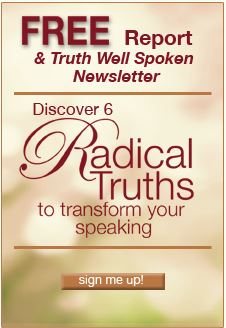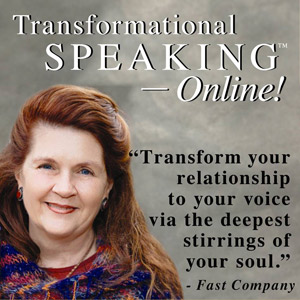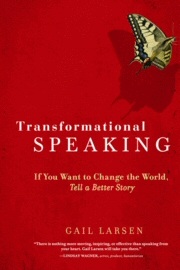The Power of Your Untold Story
“Wherever you are is called here, and you must treat it as a powerful stranger . . .”
The above line, from the poem Lost by David Waggoner, touches me each time I hear it. So often where we actually are in our lives represents the story we don’t want others to know. It may reveal that we’re not on top of our game where our culture would have us believe we are supposed to be. It may not show us in the best light when we want to impress those around us. It may expose a broken heart to even more vulnerability. So we stuff the truth and pretend it isn’t real or important, forgetting we’re all members of the Scar Clan. After all, this too shall pass. And all too often we suffer as a result – with shame, depression, a sense we should be able to move on to a story that is more acceptable and inspiring.
I’ve just returned from my annual Transformational Speaking weekend at Omega Institute. In this class for only 20 people, we discover that going beneath the surface of how we show up allows us to be seen and to connect with others in an authentic way. We recognize that our willingness to speak about where we are not only connects us to others but also connects us once again to ourselves.
The Omega class set up a private Facebook group, and as I’ve seen their postings, I recognize once again the power of our own story. Not the story used strategically so people will like us or hire us, but the story that takes us home to ourselves and allows us to connect with others around what’s real and present and sometimes raw.
One of the significant stories we explore in the work of Transformational Speaking is the story that is most active in our lives right now, the story that takes our primary attention and energy. While it’s the one we’d usually just as soon not tell to strangers, and one we won’t likely use in a speech (at least until it has informed us in a meaningful way), it’s the one that needs to be witnessed and heard by someone who will really listen. It is the story of “here” and “we must treat it as a powerful stranger, seek permission to know and be known.”
Last year in Vancouver, two friends came to my class together and on Saturday night on their own, one said to the other, “I’ve only heard pieces of that story. How about telling me the whole thing?” Apparently it was a long night! But Lori showed up the next morning cleansed and clear and eager to share what an important gift she had received because Bridgette was fully present to all that needed to be said and released, from start to finish.
My friend Kris gave me the same gift and it made all the difference. I have an unfortunate habit of falling in love and packing up my life to move to islands. (Well, I’ve only done it twice, but both moves were so devastating I’ve asked my friends if they hear me planning such an adventure again that they tie me down until I come to my senses.) The last time my love affair was with a community and a perceived way of life and sense of belonging. I’m still in the aftershock of the financial hit of that one despite the munificent growth opportunities it provided. The time before when I moved to an island my love was a man who lived in Hawaii, and when I chose to leave a year later I couldn’t move through the grief of my lost dream. My self-talk and my story replayed like a broken record. Then one day Kris and I were driving from Denver to Vail and she said she wanted to hear the whole thing.. I got to go deep and not skim the surface. We stopped for dinner and I was crying so hard that Kris later said people thought we were lovers. She hung in there, my story was expressed and I was able to begin to heal.
Perennial wisdom teaches, “You may come to my door three times with your story. After that I will turn you away.” It is good counsel. We don’t want to tell a disempowering story so often that it creates neural pathways in our brains but we also need to tell the whole thing and be heard in order to really let it go. Only then are we free of the baggage we carry about how we’re supposed to be able to move on.
Cultural anthropologist Angeles Arrien talks about the four healing salves. The teaching is that when we experience soul loss (that sense that something is missing and wherever it went it took our joy and full presence with it), we are to ask ourselves four questions.
- When did I stop singing?
- When did I stop dancing?
- When did I stop telling my story?
- When did I stop being comfortable in the sweet territory of silence?
Ah, the healing salve of telling our story – it could restore our joy so singing and dancing rise up within us again, and make it possible to be silent without the sound of our own wheels driving us crazy!
Do you have a story that needs to be witnessed and released so you can move into your full expression and your new story? Ask someone who loves you to set aside the time to listen. A therapist can be a good choice, too, but there is a special balm in someone being there who isn’t being paid – especially when they’re willing to just listen and not try to offer advice or fix anything.
Or, if there is someone you care about who needs the gift of your listening, show up and be fully present to the whole thing, without distraction or self-referencing. This is one of the greatest gifts we can give to someone we love.
LISTENING
By William Stringfellow (with appreciation to Dede Henley for sharing)
Listening
is a rare happening
among human beings.
You cannot listen to
the word another is speaking
if you are preoccupied with
your appearance or
with impressing the other
or if you are trying to decide
what you are going to say
when the other stops talking
or are debating about whether
what is being said is true
or relevant
or agreeable.
Such matters have their place
but only after listening to
the word as the word
is being uttered.
Listening is a primitive act of love in which
a person gives himself to
another’s word
making himself accessible
and vulnerable to that word.
© Gail Larsen





